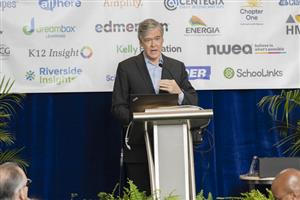- Council of the Great City Schools
- Journalist Says Urban School Leaders in the Forefront of Change
Urban Educator - April 2023
Page Navigation
- Education Secretary Cardona: School Leaders, Be Changemakers
- Fighting for Student Reading Success
- Journalist Says Urban School Leaders in the Forefront of Change
- Kansas City Names New Superintendent
- How Three Urban School Districts are Investing and Tracking ESSER Funds
- Linguist Lily Wong Fillmore Named Recipient of Dr. Michael Casserly Legacy Award
- Urban Schools Win Green Ribbon Awards
Journalist Says Urban School Leaders in the Forefront of Change
-
Veteran political journalist John Harwood alerted educators to their integral role as the nation moves toward becoming a majority minority country over the next two decades.
“You guys are on the front lines of that transition because a majority of students in public schools in the United States are no longer white. That’s where the next generation of Americans is going to be forged, and there’s going to be some fires to go through,” Harwood said in an address to big-city school leaders gathered in Washington, D.C., for the Council of the Great City Schools’ recent Annual Legislative/ Policy Conference.
Harwood, an expert in Washington politics, said that as the nation experiences accelerating shifts in demography and culture, there likely will be more protests akin to the Jan. 6, 2021, storming of the U.S. Capitol and may even intensify.

However, Harwood said he retains a base-line optimism about America’s future, citing Joe Biden’s rocky, but eventually successful, path to the presidency: his stalled campaigns in 1998 and 2008, and a slow start in 2020, before the big primary win in South Carolina that set up victory that November. Biden’s story is one of resilience, as is that of this country, said Harwood.
The speaker then focused on the words of Martin Luther King Jr., the sentiment often cited by Barack Obama during his presidency: “Let us realize the arc of the moral universe is long, but it bends toward justice.”
“I believe that's the story of the United States,” said Harwood. “And so, for all the fires that we have been through and are about to go through, I still fundamentally think that's right. And, if we do come out, bending toward justice, that will be in large part because of the efforts of people like you in this room.”
Harwood covered the presidency of George H.W. Bush and later Congress for the Wall Street Journal before becoming that paper’s political editor and chief political correspondent, and contributed to the Journal’s coverage of the Sept. 11, 2001, terrorist attacks, for which the paper received the Pulitzer Prize. He became chief political correspondent for CNBC and later White House correspondent for CNN and has done political analysis for various news outlets.
During a question-and-answer session Harwood was asked how mainstream journalism can combat misinformation and “fake news” as the nation becomes increasingly polarized. Another question: How to teach students to be journalistically and social-media literate?
Harwood acknowledged daunting issues for the news industry when a significant chunk of the population simply doesn't believe things that are true.
“The reason I got into journalism was I wanted to learn about what's true, learn about the world, and share that knowledge with others,” said Harwood. “If you have people who don't believe things that are plainly true, it's very difficult to communicate.”
Harwood is doing his part, chairing the Nieman Foundation’s Advisory Board, which awards fellowships at Harvard to journalists and holds a college journalism summit each year. The foundation is also partnering with the University of Chicago to create a campaign boot camp where journalists will train college students on the intricacies of political coverage.
Harwood laid out the challenges of teaching media literacy to youth and adults alike. “How do you describe people who don’t believe things that are plainly true, or say things that are plainly untrue?” he asked. “My business grapples with that every day. From my point of view – I’ve been doing this long enough – that to me the only value-added that matters to me is to say as bluntly and directly as possible what’s happening.”
Then he articulated his basic optimism: “Again, I do have this base-line confidence that we will move in the right direction over time, but it’s a real challenge.”
Media Contact:
Contact Name
Contact@email.com
(000) 000-0000
Contact Name
Contact@email.com
(000) 000-0000
Contact Name
Contact@email.com
(000) 000-0000
Media Contact:
Contact Name
Contact@email.com
(000) 000-0000
Contact Name
Contact@email.com
(000) 000-0000
Contact Name
Contact@email.com
(000) 000-0000


